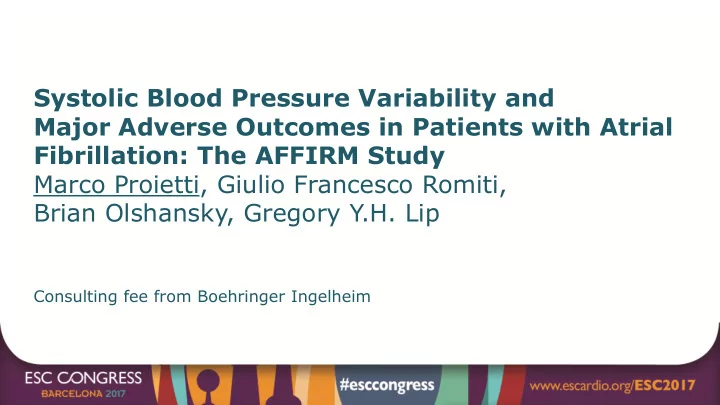

Systolic Blood Pressure Variability and Major Adverse Outcomes in Patients with Atrial Fibrillation: The AFFIRM Study Marco Proietti, Giulio Francesco Romiti, Brian Olshansky, Gregory Y.H. Lip Consulting fee from Boehringer Ingelheim
Declaration of Interest • BO : Consulting fees from Lundbeck, Amarin, and Boehringer Ingelheim. • GYHL : Consultant for Bayer/Janssen, BMS/Pfizer, Biotronik, Medtronic, Boehringer Ingelheim, Microlife and Daiichi-Sankyo. Speaker for Bayer, BMS/Pfizer, Medtronic, Boehringer Ingelheim, Microlife, Roche and Daiichi-Sankyo. No fees are received personally.
Background • Hypertension is a major determinant of stroke and major bleeding in patients with atrial fibrillation (AF) • Systolic blood pressure visit-to-visit variability (SBP-VVV) has been found to be a strong predictor of major adverse outcomes in non-AF cohorts • Data on SBP-VVV in AF patients are currently not available
Purpose and key points about methods • To evaluate the relationship between SBP-VVV and clinical outcomes in patients with AF • Data from the AFFIRM trial were used • SBP-VVV was defined according to the standard deviation of SBP measurements from baseline to follow-up • Stroke and Major Bleeding were considered as outcomes
Results • Stroke and major bleeding rates progressively increased according to SBP-VVV quartiles • A fully adjusted multivariate regression analysis confirmed that highest tertiles of SBP-VVV were associated independently with a higher risk for stroke and major bleeding
Conclusions • In long term follow-up, SBP-VVV is a potent predictor of stroke and major bleeding in patients with AF
Recommend
More recommend